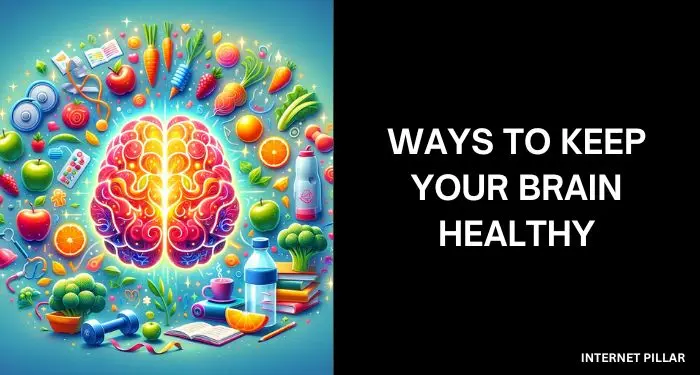Taking care of your brain is as important as taking care of your body.
By following healthy habits, you can keep your brain vibrant and resilient, ensuring it supports clear thinking and emotional well-being.
Simple daily practices can impact your brain health by reducing the risk of diseases like Alzheimer’s and Dementia.
It is important to start nurturing your brain health at any age, as mental function tends to change over time.
Despite common fears of mental decline with aging, proactive steps can help maintain sharp memory and clear thinking.

With over 6.7 million Americans over the age of 65 affected by Alzheimer’s and related dementias, it’s pretty clear that brain health should not be overlooked.
Follow these tips to keep your brain’s health safe and you will be well on your way to maintaining its optimal functions.
17 Ways to Keep Your Brain Healthy
1. Eating Right for Brain Health
Eating antioxidant-rich fruits and veggies helps protect your brain.
Whole grains fuel your brain with steady energy, while proteins from lean meats and legumes are key for brain chemicals.

A varied diet full of vitamins and minerals supports your brain’s health and shields it from damage.
2. Keeping Your Brain Sharp
Challenge your brain with puzzles, new languages, or music.
Activities like these build new brain pathways, boosting memory and mental flexibility.
3. Staying Active
Exercise isn’t just good for your body; it’s great for your brain too.
Regular workouts increase blood flow and oxygen to your brain and can even reduce the risk of cognitive decline and diseases like Alzheimer’s.
Aim for activities that get your heart pumping several times a week.
4. Enough Sleep
Sleep is important for brain function, helping with memory and clearing out toxins.
Aim for 7-9 hours of uninterrupted sleep to give your brain the rest it needs.

5. Limiting Harmful Substances
Steer clear of alcohol, drugs and tobacco to protect your brain. Also, watch your intake of caffeine and sugar and stay hydrated for optimal brain health.
6. Social Connections
Strong social ties are key for a healthy brain.
Regular interaction with friends and family can boost your mood and keep your mind engaged.
Joining groups or volunteering can also enhance your social life and brain health.
7. Managing Stress
Long-term stress can hurt your brain, leading to memory problems.
Techniques like meditation, yoga and deep breathing can help keep your brain calm and focused.

8. Healthy Blood Pressure
Keeping your blood pressure in check is important for brain health.
A healthy lifestyle can help prevent high blood pressure and protect your cognitive function as you age.
9. Emotional Well-being
Good mental health is key for cognitive function.
Anxiety, depression and lack of sleep can negatively affect your brain performance.
Prioritizing emotional health and restful sleep is essential.
10. Protecting Head from Injuries
Protecting your head can reduce the risk of traumatic brain injuries (TBIs), which are linked to cognitive decline.
Service members should wear helmets during risky activities.
It is also important for everyone to use seat belts, avoid risky sports and replace helmets according to safety guidelines.

11. Engaging in Games
Playing new games or card games like poker and bridge can stimulate your brain.
Learning and strategizing in these games can improve memory and cognitive skills, especially as you age.
12. Mediterranean Diet
Adopting a Mediterranean diet, rich in fruits, vegetables, whole grains and healthy fats, can lower the risk of dementia.
The omega fatty acids in foods like olive oil are believed to be beneficial for brain health.
13. Managing Health
Keeping blood sugar, cholesterol and blood pressure in check is important for brain health. Unhealthy levels are linked to a higher risk of dementia.
A healthy lifestyle, regular check-ups and possibly medications are ways to manage these.
14. Meditation
Daily meditation can reduce stress and enhance cognitive functions like memory and information processing.

Even a few minutes of meditation daily can make a difference.
15. Avoiding Harmful Substances
Tobacco and excessive alcohol use are harmful to brain health and can increase the risk of dementia.
Quitting smoking and moderating alcohol intake are recommended for maintaining cognitive function.
16. Staying Hydrated
Staying hydrated is important for cognitive clarity and overall brain function.
Dehydration can lead to concentration difficulties and cognitive decline.
17. Brain Challenges
Regularly engaging in activities that challenge your brain, such as learning new skills or hobbies, keeps the brain active and supports cognitive health.

These tips will help you to keep your brain healthy and active.



